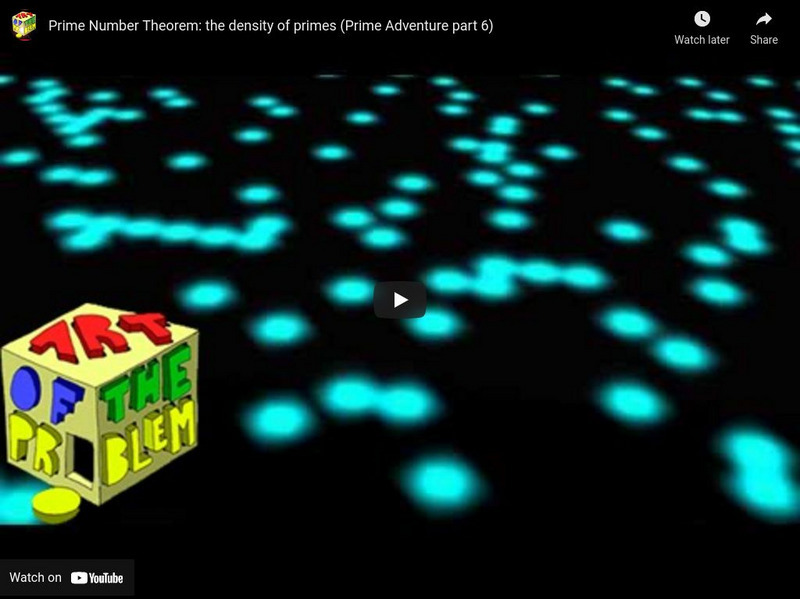Hi, what do you want to do?
msvgo
Understand and Find Square Roots
It introduces square roots and explains how to find square roots through repeated subtraction and prime factorisation.
KnowMo
Prime Numbers, Factors, and Multiples Explained
In this video, the presenter discusses prime numbers, factors, and multiples. They explain that a prime number only has two factors, one and itself, and provide a list of prime numbers up to 50. They also discuss factors as numbers that...
Curated Video
Simple Discrete Distributions and Example Questions
The video is a lecture on simple discrete distributions. It begins with an explanation of what a discrete random variable is and gives an example using rolling a 10-sided die to illustrate the probability distribution. The video then...
Curated Video
GCSE Secondary Maths Age 13-17 - Number: Prime Numbers - Explained
SchoolOnline's Secondary Maths videos are brilliant, bite-size tutorial videos delivered by examiners. Ideal for ages 13-17, they cover every key topic and sub topic covered in GCSE Maths in clear and easy to follow steps. This video...
Brian McLogan
How to Multiply Two Radical Expressions and Then Multiply
👉 Learn how to multiply radicals. A radical is an expression or a number under the root symbol. To multiply radicals with the same root, it is usually easy to evaluate the product by multiplying the numbers or expressions inside the...
KnowMo
Understanding Prime Numbers
In this lecture video, the topic of prime numbers is explored. The definition of a prime number is explained as a number with only two factors, one and itself. Examples of prime numbers and non-prime numbers are provided, and the special...
Curated Video
Finding the Greatest Common Factor
In this video, the teacher explains how to find the greatest common factor (GCF) of two or more numbers by creating and comparing a list of factors for each number. The teacher emphasizes the difference between factors and multiples and...
Let's Tute
Probability: Drawing Cards with Specific Numbers
In this video, the teacher explains how to solve probability problems using examples of drawing cards with specific numbers on them. They break down the steps to find the probability of drawing a prime number less than 10 or a perfect...
Zach Star
This completely changed the way I see numbers - Modular Arithmetic Visually Explained
This completely changed the way I see numbers - Modular Arithmetic Visually Explained
Professor Dave Explains
Divisibility, Prime Numbers, and Prime Factorization
Understanding prime numbers.
Why U
Pre-Algebra 09 - Division and Prime Numbers
The building blocks of all natural numbers are the prime numbers. The early Greeks invented the system still used today for separating natural numbers into prime and composite numbers.
Curated Video
Find the GCF and LCM using prime factorization
In this lesson you will learn how to find the GCF and LCM of two whole numbers by using their prime factors.
Curated Video
Mathematicians at UCLA have discovered a 13 million-digit prime number, a long-sought milestone that makes them eligible for a $100,000 prize.
HEADLINE: UCLA researchers find largest known prime number
CAPTION: Mathematicians at UCLA have discovered a 13 million-digit prime number, a long-sought milestone that makes them eligible for a $100,000 prize. (Sept. 28)
...
Sky News
The worlds longest prime number is discovered
The worlds longest prime number is discovered
Curated OER
What's a Prime Number?
What is a prime number? Is zero a prime number? Is one a prime number? No?! Is two a prime number? Yes. So what is the definition of a prime number? A prime number is a number that can only be divided by 1 and itself. Watch this short...
Curated OER
How Do You Factor a Greatest Common Factor Out of an Expression?
What is the greatest common factor of two terms in an expression? First prime factor each of the terms. Then find the factors that they have in common. Multiply if needed. That is how to find the greatest common factor. Watch the video...
Math Playground
What is Prime Factorization?
A teacher describes how to find the prime factors of 525. She starts by describing how to use a factor tree to describe the factors of a number. Next, she uses increasingly difficult examples to illustrate this concept.
Math Playground
What is a Prime Number?
Review the characteristics of prime numbers. The narrator begins by defining factors and then goes on to explore the definition of prime numbers. This is a quick and easy way to review prime numbers.
Annenberg Foundation
Annenberg Learner: Mathematics Illuminated: The Primes
A detailed look at the importance of prime numbers, not only in math, but also in science and in the field of cryptography. [28:27]
Sophia Learning
Sophia: Simplifying Radicals With Prime Factorization
This video tutorial demonstrates how to simplify radicals using prime factorization. The lesson includes detailed examples. There is also a self-assessment for learners to check themselves. Video
Khan Academy
Khan Academy: Computational Number Theory: The Prime Number Theorem
How can we estimate the number of primes up to x?












